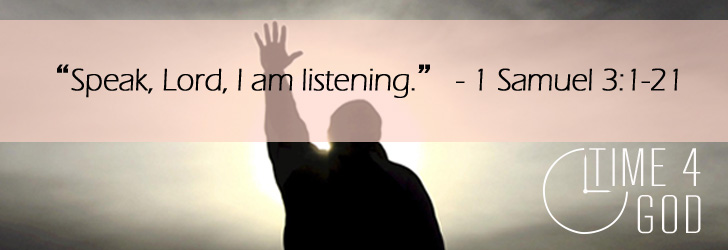Lord, I Am Listening
I love this story about the young Samuel. He was apprenticing with Eli as a minister to the Lord in the Temple, but he was young…

I love this story about the young Samuel. He was apprenticing with Eli as a minister to the Lord in the Temple, but he was young and: ʺAt that time Samuel was not familiar with the Lord, because the Lord had not revealed anything to him as yet.ʺ (1Samuel 3:7) One night, while Samuel slept, he heard a voice calling him. Thinking it was blind Eli calling him, he went to Eli and said, ʺHere I am.ʺ We know the story. This happened a total of three times and each time Eli told Samuel it wasn’t him who called, ʺGo back to sleep.ʺ Finally, Eli realizes what is going on and tells Samuel that the next time it happens he should respond to the voice calling him by saying, ʺSpeak, Lord, for your servant is listening.ʺ (1 Samuel 3:9) From then on the Lord was with Samuel and would not let any of his words be without effect. He was seen by all of Israel to be ʺan accredited prophet of the Lord.ʺ (1 Samuel 3:20)
[content-ad]
Brothers and sisters, we are Samuel today. God is calling us by name. He is asking us to be his good and faithful servant in the world now. Do we say to him, ʺSpeak, Lord, I am listeningʺ? The key in this passage from the first book of Samuel is in the word; ʺlistening.ʺ At first, Samuel, in his innocense, goes to Eli and says, ʺHere I am.ʺ Do we not say that to the Lord as well? We have responded to the initial call. We have turned to it, but is that enough? Once we respond to the call we must then ʺlistenʺ to what God is trying to say to us; to what he is trying to get us to do for him. Those questions are not to be answered by us, but by God. When I say ʺHere I amʺ I am saying I have heard the call, I am here. We might be tempted to feel really good about that; to pat ourselves on the back, for being obedient to the call. But we have to live beyond that moment. The call is not just for a response, but to get our attention, to get us to listen to God’s desires for us, to hear what the Master wants us to do for the people, or what he wants us to tell them in his name. For this we must be patient. We must be quiet. We must listen with all of our being.
We can believe that God wishes to use us for his good in the world. The good that we do must come from God, though, not from our own intentions, no matter how good they seem. How do we listen to God then? Every time we read the scriptures we are listenting to the word of God. When we hear the scriptures read in our Churches, we are listening to God speaking to us directly. How often do we get distracted in our reading, or in our ʺlistening,ʺ even at Church. We all know that it is easier to tell people what we think they should know, but to really listen to another is sometimes hard for us. Have you ever been in a deeply important discussion, or even an argument about something very important and found yourself thinking of your next response while the other is trying to explain his or hers? I know I have. The point is that we all too often miss the salient, most enlightening message of the other, precisely because we are not really ʺlisteningʺ to them.
We need to learn the art of listening in our prayer lives too. Have you ever noticed how we seem to do all the talking in our prayers? Do we consciously provide silent times in our Church services that allow us to ʺhearʺ in the depths of our hearts what God is saying to us in the scriptures or in our prayer time. Or is it more about shouting our praise and singing mightily? Does God really need just that from us? He needs us to give him our fullest attention, to listen with all of our being to what he is trying to say to us. For that we need quiet spaces in our services and in our prayers.
Let us, then, go to prayer, like Samuel, saying, ʺSpeak, Lord, your servant is listening.ʺ In the end the greatest of all prayers is, ʺThy will be done.ʺ It is not my will, but God’s that I need to practice listening to. How can I know God’s will, unless I grow quiet enough, inside and out, to really ʺlistenʺ deeply enough to ʺhearʺ what his will for me really is? To listen is to pay attention. Attention is the first step in knowing anything. Let us ʺlistenʺ more to God. In this we will come to know his will for us more surely.
SKM: below-content placeholderWhizzco for FHB

